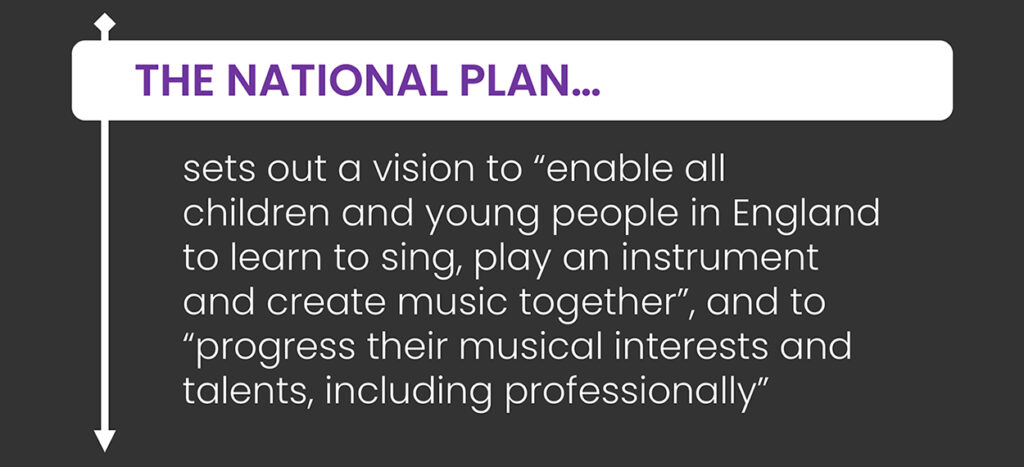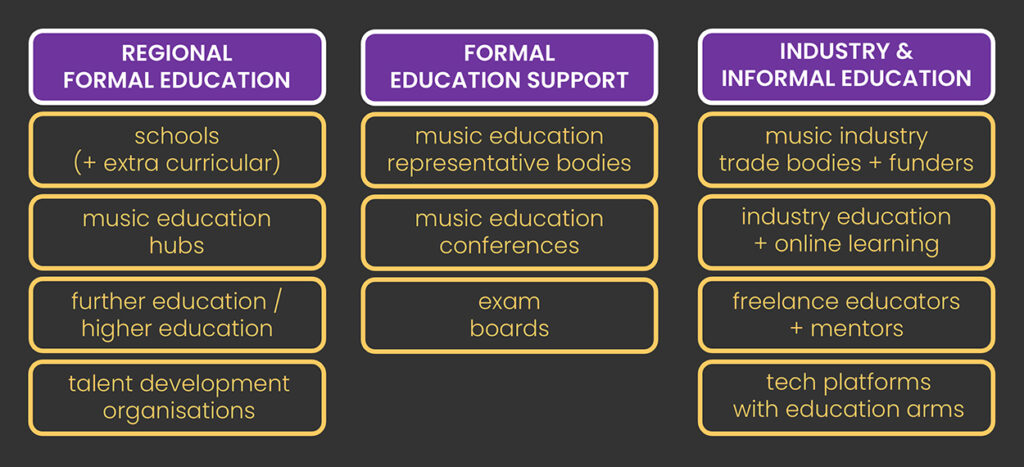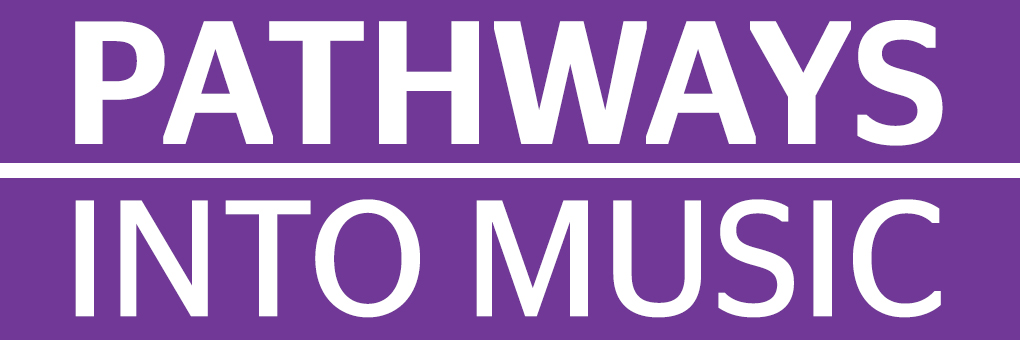This website uses cookies so that we can provide you with the best user experience possible. Cookie information is stored in your browser and performs functions such as recognising you when you return to our website and helping our team to understand which sections of the website you find most interesting and useful.
Pathways Into Music Research
Dissecting the National Plan For Music Education
Published in May 2023

The UK government published a new National Plan For Music Education in June 2022. At the Music Education Conference 2023 – presented by CMU and Pathways Into Music at The Great Escape – we considered the elements of the Plan that are most relevant to our ongoing work connecting music industry and music education. Below is the overview we presented at the start of the conference to inform that day of discussions.

The new National Plan For Music Education is a blueprint for the evolution and development of music education in England between now and 2030 – building on an original plan that was published in 2011.
It was published in June last year after more than two years of consultation involving people working in a plethora of roles in music, music education and the music industry.
It sets out a vision to, and I quote, “enable all children and young people in England to learn to sing, play an instrument and create music together”, and to “progress their musical interests and talents, including professionally”. Which, I think we can all agree, is quite a wide remit.
The ambition to ensure that every child and young person can experience the joy of music making is, of course, crucial, though our focus is that latter objective – ie to enable children and young people to “progress their musical interests and talents, including professionally”.
What does that really mean and how can it be achieved? And what support and resources will be needed to achieve it?
Of course, as with any big government document, the National Plan is open to interpretation. And you might be optimistic, or pessimistic, or maybe just cautious about what can be realistically achieved.
And we should remember the relatively restricted scope of this Plan. It directly impacts on just certain strands of music education – what happens in and around primary and secondary schools, in the classroom and extra-curricular, and the role of the local music education hubs in supporting schools and all that activity.
And it only directly applies in England, with education being devolved in Scotland, Wales and Northern Ireland.
However, we feel that there are a number of key messages in the Plan that are worth considering and embracing.

Ten of the most important things the National Plan says:
1. Every child should have the opportunity to learn a musical instrument through whole-class ensemble teaching programmes.
2. Ensure all young people can access high-quality music education, regardless of their background or location.
3. Develop new approaches to support underrepresented groups in classical music and the wider music industry.
4. Strengthen partnerships between schools, music hubs, and the wider music industry.
5. Build on local musical ecologies and resources to support music education.
6. Clear progression routes should be available and affordable to all young people.
7. Provide clear information about musical pathways and creative careers.
8. More needs to be done to showcase how career options in the music industry are sustainable and rewarding.
9. Signpost routes into further and higher education in music
10. All music educators, including in further and higher education, and hubs and industry to help young people to understand routes into careers in the music and wider creative industries.
Let’s now consider in a little more detail a few of those points and the questions they pose. These are all questions we discussed at the 2023 Music Education Conference.

Local music ecosystems
Local ecosystems play a crucial role in the development of young music-makers – and for young people pursuing a career in music or the wider creative industries.
The Plan states that “hubs should consider how they can make better use of local assets and build on local musical ecologies” to support the music education of young people.
By tapping into local resources, such as music venues, music festivals, other music industry companies and employers, local music industry professionals, and any other educational or talent development organisations, we can create a thriving environment for musical development.
But how do we make that happen? We know that a vital part of achieving that objective is mapping music education and the music industry at a local and regional level.
Doing this gives school’s hubs, educators, industry and other stakeholders a clear view of their local music ecosystem allowing them to identify what makes their area unique, and to draw everyone together to nurture and support creative talent locally and regionally, and across the country.
That’s why we created a music industry taxonomy, to help with this process of local music industry mapping.
But what is the best way for schools and hubs to map their local music ecosystem, and to then build stronger connections between key people and organisations in that ecosystem?


Connecting all sources of music education and support
We also think it’s important to connect the dots between all the different kinds of music education, and providers of music education.
First, between the different providers in the above matrix which we are developing as part of our music education mapping work.
And also between framework-based education, practice-based education and outcome-based education.
Framework-based education being learning structured around a specific programme or curriculum, and often with a specific qualification attached.
Practice-based education being based around honing creative skills – playing an instrument, writing and composing music, producing music, or creating other kinds of music content. This learning may also involve earning qualifications, though usually pursued at each learner’s own pace, as and when they are ready to progress.
Outcome-based education is learning accessed by people to achieve a specific outcome, possibly a very specific outcome, to help them achieve a music-making or career objective, and so they can move along their own pathway into music.
The National Plan is more focused on framework-based and practice-based education, but the same young people will usually be utilising outcome-based education at the same time. One example is the online sources of information, knowledge, support and resource that early-career music-makers – and anyone pursuing a career in music – is now routinely accessing.
We are interested in how online learning and more formal kinds of learning should interact, and how each strand complements the other.

Clear progression routes
This is another passion of ours. Helping young people identify the right pathway into music that will help them achieve their objectives and ambitions.
High achievers in many communities are often directed towards specific professions – law, medicine, finance. These are professions that everyone has a basic understanding of, even if they don’t know what lawyers, doctors and bankers do day-to-day.
They are also professions with clear pathways – clear career routes and qualifications that generally guarantee work, and which therefore have a more assured return on investment – both the time investment and, once a person heads into higher education, a cash investment.
Roles and careers in music are less obvious, less clear, less assured. The National Plan notes that teachers, parents and carers are often “concerned that music is an uncertain industry” and urges educators and industry show that careers in music can be “sustainable and rewarding”.
Our mapping work has put the spotlight on the different career routes in music. That includes the frontline artist career, but also careers as portfolio musicians, and within the music industry itself. We are also interesting in identifying what skills people need to succeed in music today.
And with the National Plan looking ahead to 2030, what skills will ensure people can prosper in the music industry of the next decade?

Connecting schools to HE
And finally, building connections between schools and further and higher education. Although the Plan’s focus is primary and secondary education, we are also interested in what is happening at college and university, especially if – at that stage – people choose to specifically study music business, either as part of a specific music business degree, or as part of a wider course.
How should music business programmes keep up with the rapid evolution of the industry, and how can industry and educators work together to create future industry leaders?

So, lots of questions, lots of conversations, lots of insights and lots of ideas. And all sparked by a government document – who’d have thought it possible?






